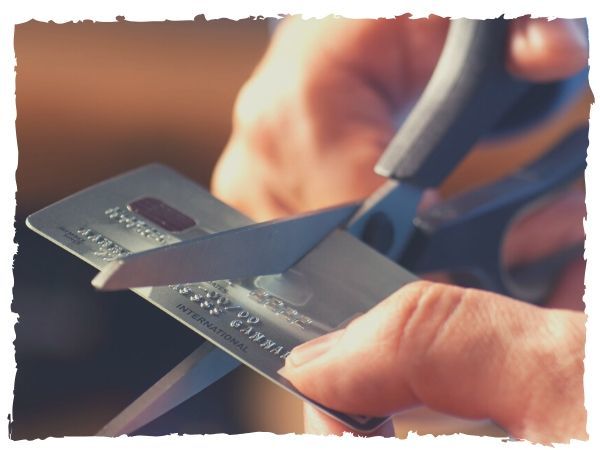When you think about someone who lives a frugal lifestyle, does your mind automatically picture someone who is putting tight restraints on their spending, and therefore missing out on some things that you believe make life so wonderful?
Well…yes and no.
Living frugally simply means that you’re intentional with how you spend your money.
You’re aware of your priorities and values and what you need to do to obtain those things in life. You can identify the things that are less important to you and therefore reduce your spending in those areas.
So while one person may think another is “missing out” because they don’t have the newest or most upgraded smartphone, the other person may not value extensive smartphone features the way that they value the idea of having money to travel in the future.
I recently had a lesson in frugality when my expensive, popular name brand dryer needed a second repair within the three years that I’ve owned it. The first repair had cost me about a third of what I had initially paid for the dryer.
When the second repairman was finished looking at the most recent issue, he told me it would be less expensive to buy a new dryer than it would be to fix the problem.
I couldn’t believe that to be true, but the repairman went on to ask me how many of the 17 settings on my dryer I use.
…I think…two?
He then made the extremely valid point that there’s no use in spending excess money on features that I never use–especially because all that does is increase the number of things that could possibly go wrong with the machine.
He quickly convinced me to buy a durable, affordable, and dependable option that I have found provides me with the exact same outcome that the last product did. It dries my clothes.
This is just a personal example of figuring out what your priorities are and cutting costs where you can so you can use that money in the future in ways that will benefit you more.
Living frugally means something different to everyone, depending on your lifestyle. You may want to start living frugally to pay off debt, save more aggressively for retirement, or just to make ends meet.
But with statistics showing that 62% of the people in our country are stressed out about financial issues, chances are, you could benefit from some money-saving tips.
In this article, I will share some frugal living tips that you can incorporate into your life. Of course you don’t need to adopt them all, but hopefully you will learn some pointers here that can help you move closer toward your financial goals.
50 Best Frugal Living Tips to Save Real Money
1. Meal Plan
Meal planning is popular because it works.
Planning what your family will eat for the week ahead of time lets you use your current pantry inventory, keep track of your family’s favorite meals, and stick to a budget-friendly grocery list of items you actually need to make your meals.
2. Walk to Work
Save money on gas by walking to work (or biking) if your commute makes it possible to do so. If not, ask your employer if you can work remotely from home one or two days a week to save on travel expenses.
3. Program Your Thermostat
According to the U.S. Energy Information Administration, heating and cooling account for just under half (42%) of home energy costs–and a lot of these costs occur when you’re heating or cooling unused spaces (such as when you’re not home or asleep).
Program your HVAC system to keep your house at the best temperature only at times when you’re home and need the temperature to feel comfortable. This way, when you’re at work for the better half of the day, you’re not wasting money on utility bills by maintaining a certain temperature in your home.
4. Plan Your Errands
When you have errands to run, plan your route in a way that keeps your stops all in the same area, allowing you to drive the fewest miles possible.
It’s also a good idea to set aside just one day to run your errands rather than making a lot of smaller trips during the week.
5. Wait Before Buying
If you come across something that you want but don’t need, wait 24-48 hours before committing to buying it. Impulse buying can be a big source of money down the drain, and more often than not, you will decide against making the purchase anyway.
Waiting also helps you prevent lifestyle creep. The video below talks about why lifestyle creep happens and a few examples and gives 7 simple habits to avoid the temptation of this mindset.
6. Get Rid of Cable
It took me a while to take this leap, but what I considered to be a “leap” at first was hardly a small step.
With Netflix, Amazon, YouTube, and all of the other streaming options, I realized I really was never watching regular television anyway. And, even so, there are better things to do with your time.
7. Buy Produce that’s in Season
Buying produce that’s in season will save you money simply due to supply and demand. Out-of-season produce requires more travel, time, and unnecessary expenses to grow in a greenhouse, and those extra costs get passed on to the consumer (you).
8. Use Cashback or Money Saving Apps
Apps such as Honey, Ibotta and Rakuten can help you get some money back on your everyday purchases. When you couple this with store coupons and plan wisely, you can end up saving a lot of money.

I use Ibotta, and here are my monthly earnings thus far. I’m only shopping for myself and one young child, so these numbers could be much higher for those of you with more people living in your home.
9. Buy “Previously Loved” Items
Most (all?) cities have Facebook “buy, sell, and trade” groups where you can buy things at a small fraction of the retail price. This is a great place to look if you’re in the market for furniture, kids’ toys and books, and even services (such as gutter cleaning or lawnmowing).
10. For Large Expenses, Aim for “Mid-Range” Items
This goes back to my whole dryer fiasco. When you’re shopping for cars, appliances, or anything that you know you will be using on a regular basis, there is a difference between being cheap and being frugal.
Being cheap is buying the least expensive item you can find, however, this often leads to costly repairs due to the low quality of the item, or it becomes a complete waste of money because the item breaks soon after you buy it, putting you back in the position of shopping for it all over again.
Products that are in the mid-range in price usually have the durability that you’re looking for, but lack the extra features that you a) don’t need and b) increase the likelihood of something breaking.
11. Stick to Your Shopping Lists
Whether you’re going to the grocery store or a store like Target or Walmart, stick to the list that you’ve made.
You can use the Cozi app for making lists–it’s free and you can share it with the whole family so you don’t end up buying two of something because more than one person in your family stops by the store.
12. Grow a Garden
Check out what fruits and vegetables can be grown at home and start your own garden where you can literally hand-pick your meals. This is something that you can do that will keep saving you money over a long period of time.
13. Don’t Get FOMO from Sales
I’m actually currently dealing with a great example of this. Several weeks ago, I was in a thrift shop and came across a designer dress for sale with its original price tag still attached.
I tried it on, it didn’t really fit, I personally considered it to be ugly, but I’m also aware that I don’t really understand some of these extremely high-end designers.
Realistically, seeing as it was 98% off on the thrift store rack, I couldn’t just let it sit there for someone else to discover.
But I’m starting to feel like those seven spent dollars…were a waste.
If you see something on sale–whether it’s a major discount or only a little bit–consider first if you would want the item if it were free to begin with before jumping at the opportunity to “save” money.
14. Buy Reusable Items
You might not realize how quickly you go through paper towels until you get down to your last roll and you know you won’t make it to the store for a few more days.
Make initial investments in things like microfiber cleaning cloths, wool dryer balls, and glass food containers to save money in the future on the disposable items that you’re used to buying.
This is also better for the environment.
15. Buy Generic
When it comes to the staples in your pantry–flour, sugar, salt–buy the store brand.
Even for over-the-counter medications, just look at the active ingredient in the generic version vs. the brand name and you will likely see that they’re exactly the same, but have a huge price difference.
16. Cut Up Your Credit Cards
Yes, it’s simple to charge things to a credit card today and worry about paying for them later. But when “later” comes around, you’ll realize how much all of those little things added up.
Then, if you don’t have the cash to cover all the small things you purchased–most of which are probably long gone–you’ll end up paying interest.

If you’re already in debt due to past credit card use, check out Unbury Me, which is a loan calculator that will help you pay off your debts. And, in the future, stick to using cash from the start to avoid spending money that you don’t have.
17. Don’t Buy Bottled Water
Buy reusable water bottles that you can fill up with filtered water from your tap. Not only will this save you money, it will also help you save on waste that ends up in the landfills.
18. Implement a Spending Freeze
Implementing a spending freeze every once in a while can help you make huge progress toward your frugal lifestyle goals. Here is a guide to imposing a spending freeze that will give you a better understanding of how much money you needlessly spend on a regular basis.
By not spending any money (aside from necessary bills and food) for a predetermined amount of time, you will be able to get an idea of just how much you could be saving.
19. Auto-Draft Your Payments
Having your bills automatically come out of your bank account will help you avoid late fees if you accidentally miss a deadline. It will also help you save on the convenience fees that are often charged if you use a debit or credit card to pay a bill.
20. Avoid ATM Fees
Some banks offer a benefit of waiving any charges from using a different bank’s ATM, but not all banks do this.
If you’re not offered this benefit, stick to the ATMs that are directly linked to your bank if you need to make a cash withdrawal. Otherwise, you may end up paying up to $6 in convenience fees for both banks combined.
21. Upcycle
Before getting rid of something that you don’t use anymore, see if you can upcycle it in some way. Here is a gallery of various ways you can upcycle items that you’re no longer using and make them into something both useful and beautiful.
22. Use Online Coupon Codes
Always search for online coupon codes before making an online purchase. If you can’t find one, see if there is a mailing list you can join for the company that will offer you a certain percentage off of your first purchase after entering your email address into their system.
23. Buy a Membership
If there is a museum that you frequent or a zoo in your area, go ahead and buy a yearly membership. Even if it seems expensive up front, it will likely quickly pay for itself if you know you will be visiting the place often.
This will also give you and your family something “free” to do on days that you don’t have anything planned.
24. Hang Your Clothes to Dry
Whenever possible, use a clothes line or a drying rack to hang dry your clothes. This will help save you money on energy expenses–plus, it is more gentle on your clothes and will help them last longer.
25. Buy Your Own Modem
While this is an up-front expense, buying your own modem instead of leasing it from your internet provider will save you money in the long-run.
26. Check Out YouTube Videos
If something in your house breaks, check out some YouTube videos to see if it’s an easy DIY fix.
I recently saved (what I assume to be) a ton of money by following the instructions of a short YouTube video that walked me through removing a complicated drain stopper on a tub in order to de-clog it. This saves money and–let’s be honest–will make you feel completely capable.
27. Wash Your Clothes in Cold Water

Due to advances in detergent formulas and the designs of washing machines, almost all clothes can now be washed in cold water.
Using the cold water cycle has two benefits: It will save energy (and money) and it isn’t as harsh on your clothes as hot water is, so it can extend the life of just about everything you wash.
28. Make Use of Your Local Library
If you have children, have you ever bought what you thought would be the perfect book for them with beautiful pictures and a meaningful story?
And then once you started reading it to them, they were less than impressed–and, despite the excitement in your voice when offering to read it in the future, they constantly turn it down in favor of their same. old. favorite?
Aside from giving you free access to what can only be considered to be endless resources, going to the library also lets you “try before you buy” when it comes to any book (not just kids’ books) which can definitely save you money in the end.
29. Ask for Samples
If your doctor prescribes you with a medication that you expect will come with a high cost, ask if their office has any samples that you can try. Sometimes, they will give you enough samples to last you quite some times before you will have to fill the prescription.
30. Cook in Bulk
Cook in bulk when you can and then portion the leftovers to store in the freezer.
Not only will this save you money, it will also save you time and effort on those nights you don’t want to cook and are tempted to grab something “to go” at a restaurant. To get started, here is a 8-step process on how to meal plan.
31. Use Less
You probably don’t need to use as much laundry detergent/shampoo/dish soap as you do. A little bit really does go a long way, so look at the label and see what they recommend and compare that to how much you’re used to using.
32. Stock Up
When something is on sale (or especially on clearance), buy as much of it as you can so you won’t have to buy it again for a while in the future.
Often at my grocery store, they will have a “Spend $40, Save $10” deal on paper products, and I always stock up during those sales. That makes the entire purchase 25% off!
33. Don’t Buy Portioned Foods
I know it’s so much easier to buy pre-cut fruits and vegetables and snack-sized bags of chips, but doing so is a lot more expensive than taking the time to portion these things out yourself.
Furthermore, eating pre-cut fruits and vegetables comes with its risks, as these foods are often a source of food-borne illness.
34. Pack Your Lunch
I think we have all realized the cumulative costs of eating at restaurants on a regular basis. Pack your lunch and snacks for work instead of grabbing something while you’re out. This will help you improve your health as well as your finances.
35. Shop Alone

The more people you bring shopping with you (mainly children), the more likely you are to spend extra money. They will inevitably see something that they want that they wouldn’t have otherwise known about–and half the time, you may give in.
36. Shop Your Pantry
What can you make out of what you already have at home? Use Supercook.com to enter the ingredients that you have on hand and find recipes online that you could prepare right now.
37. Watch Your Oven Use
This is actually a personal pet peeve of mine–if you have something small that you want to reheat (or even cook for the first time), don’t use the energy to heat up your entire oven to do so. If you have a toaster oven that can fit the item, it will serve the same purpose.
38. Save Your Baby Essentials
After having your first baby, don’t rush to get rid of all of the items taking up space in your house once your baby outgrows them.
Keep toys, clothes, rockers, and your crib for a little while, even if you aren’t planning to have a second child any time soon. You never know what you may decide in the future, and rebuying all of those items is expensive.
39. Only Use What You Need
Turn off the lights when you leave the room, don’t let your water run while you’re brushing your teeth, don’t leave things plugged in that you’re not using. All of these things add up in expenses. (Use an expense tracker to help you budget more efficiently.)
40. Change Your Light Bulbs
Buy LED light bulbs instead of regular ones. They will last much longer and are environmentally friendly.
41. Cook While You’re on Vacation
I know you probably don’t want to worry about preparing your own food when you’re on a trip, but do your best to eat “in” as much as you can. Bring snacks with you from home to have for your trip and check out the local grocery stores wherever your destination is.
42. Exercise Outside
Cut down on gym costs by going for runs outside or following some free exercise videos on YouTube. Here is a full body workout video, and if you’re looking for something a bit more low key, you can follow this yoga instructional video.
43. Create a Budget
…and stick to it. Sites like Mint.com can help you track any money that comes in and goes out.
As of 2016, only 41% of Americans used a budget to manage their finances–and it’s hard to stay on track with your money goals if you don’t know where you stand at any point.
44. Declutter and Downsize
If you got rid of everything that you own but don’t use, would you need to have such a large living space?
Studies show that houses have drastically increased in size since the 1970s–but the number of people living in each of these large houses has decreased. Having a smaller house will result in a lower mortgage payment, as well as lower utility and maintenance costs.
Downsizing and simplifying your life isn't only cost effective; it's also vital in finding more meaning in living.
45. Reduce Insurance Costs
This is something that you don’t want to be cheap with, but you certainly can shop around for competitive rates. Get several quotes each year for things like car insurance and homeowner’s insurance.
46. Don’t Buy a New Car

Buying a brand new car has been referred to as the “single worst financial decision” you can make. Your car’s value will go down 20-30% during its first year of life. Instead, go for the “barely used” car and save a ton of money.
47. Shop with Gift Cards
You can buy store gift cards at a discounted rate on sites such as Cardpool.com. The card codes are often emailed to you right away, so you can use them the same day you find them.
48. Literally ASK for Discounts
I recently agreed to have a company come out and spray for mosquitos and other pesky bugs every other month.
The price they charge for this service is about $50 per month and I essentially told the person on the phone that I didn’t want to pay that much. So she gave me the service for $35/month. It can’t hurt to ask.
49. Use a Discount Prescription Program
If you pay a lot for your prescriptions, look into programs such as GoodRx, RxAssist, or Cost Plus Drugs. These resources can help save you a ton of money on expensive prescription drugs.
50. Travel at Odd Times
Try heading out for your vacation mid-week on a Tuesday or Wednesday, as it’s cheaper to fly during the week. Also, look for flights with discount airlines so you can pay less to travel and have more spending money for your trip.
Final Thoughts on Frugal Living
You may think that frugal living will make you feel like you’re depriving yourself, or it won’t really make that big of a difference.
However, by implementing some of these tips and creating financial goals and priorities, you will be more likely to start making even bigger changes. Be intentional with your spending, and then sit back and watch your money grow.
By taking control of your money and your future, you can stay focused and progress toward living the future you want. Start with a few of these tips, and once you see how easy they are to adopt, you’ll likely start using more.
And if you're looking for more resources to help you stay frugal, read these articles:
- Best Finance Books Help You Manage Money
- 11 Simple Habits to Stop Spending So Much Money
- 9 Ways to Stop Impulse Buying & Curb Your Spending

Connie Mathers is a professional editor and freelance writer. She holds a Bachelor's Degree in Marketing and a Master’s Degree in Social Work. When she is not writing, Connie is either spending time with her daughter and two dogs, running, or working at her full-time job as a social worker in Richmond, VA.


